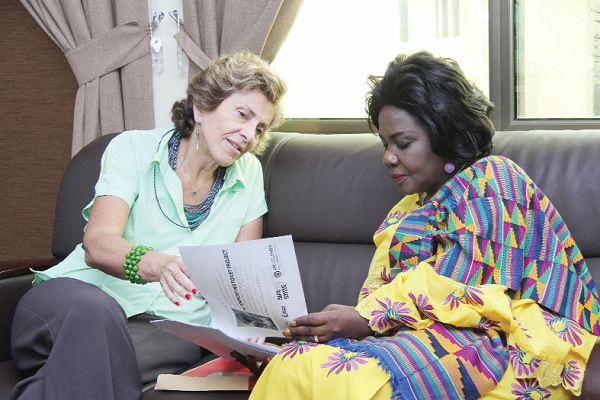
15,000 Toilets constructed in homes in Accra
More than 15,000 toilets have been constructed in various homes in Accra since December 2018 under the Greater Accra Metropolitan Assembly Sanitation and Water Project (GAMA-SWP).
The GAMA-SWP was initiated by the Ministry of Sanitation and Water Resources and the Accra Metropolitan Assembly as means of ensuring that every household in the city acquired a toilet facility. The project’s aim is to promote a clean and healthy environment.
With support from the World Bank and the AMA, the cost of a toilet structure is pegged at GH¢1,100 for a concrete block toilet and GH¢600 for an aluminium structure.
Under the project, the government would pay 70 per cent of the construction cost for the toilet facility while households would bear the remaining 30 per cent.
Eliminating open defecation
The Minister of Sanitation and Water, Mrs Cecilia Dapaah, disclosed this when the Columbia Ambassador to Ghana, Mrs Claudia Turbay Quintero, paid a courtesy call on her at her office in Accra yesterday.
The Columbia envoy and the Minister of Sanitation and Water Resources deliberated on ways the two countries could collaborate in the areas of water and sanitation for their mutual benefit.
Mrs Dapaah said the GAMA-SWP project, which sought to eliminate open defecation, had made huge strides in its implementation, hence the need to replicate it all over the city and the country at large.
She underscored the need to end open defecation and urged households to help in eliminating the menace by having toilet facilities.
Furthermore, she challenged young women to marry men who had toilet facilities in their homes, adding that, “If you are a woman and your fiancé doesn’t have a toilet facility in his home, do not marry him”.
Touching on the bilateral relations between Columbia and Ghana, Mrs Dapaah said the two countries would continue to pursue south-south cooperation, a broad framework of collaboration among countries of the south in the domain of politics, economics, socio-cultural, environment and technology.
She said because Ghana and Columbia had similar difficulties, there was the need for effective collaboration with regards to development issues and shared knowledge in technology for their mutual gain.
Composting toilet model
For her part, Mrs Quintero said her outfit was undertaking a project called, “Composting Toilet Project”, that sought to introduce a new toilet model in Ghana.
She explained that the model was such that the end products from the toilet would be turned into compost for agricultural purposes.
To get more people interested in the project, Mrs Quintero said the Columbia Embassy would in February train trainers who would transfer technical and methodological knowledge in the construction of composting toilets.
Mrs Quintero said the Columbia Embassy in Ghana would collaborate with the government of Ghana in order to make the project a success.
